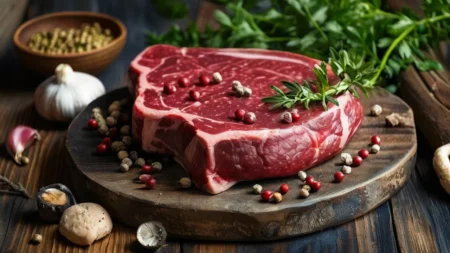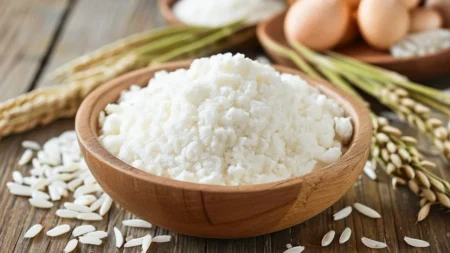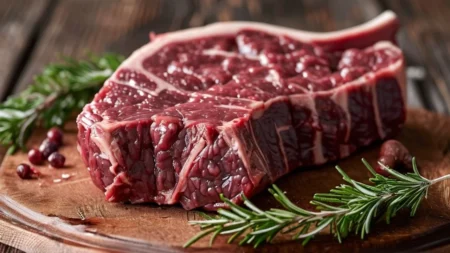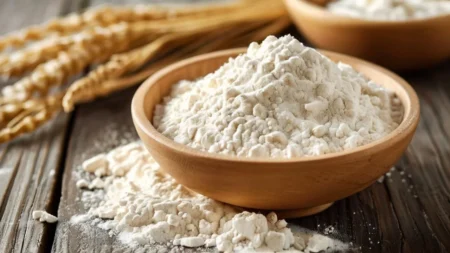Welcome to our guide on fresh asparagus! Whether you’re a seasoned cook or a culinary novice, this article will provide you with valuable tips and techniques to make the most of this delicious and nutritious vegetable. From buying the freshest asparagus to mastering cooking techniques and discovering mouth-watering recipes, we’ve got you covered. So, let’s dive into the wonderful world of asparagus!
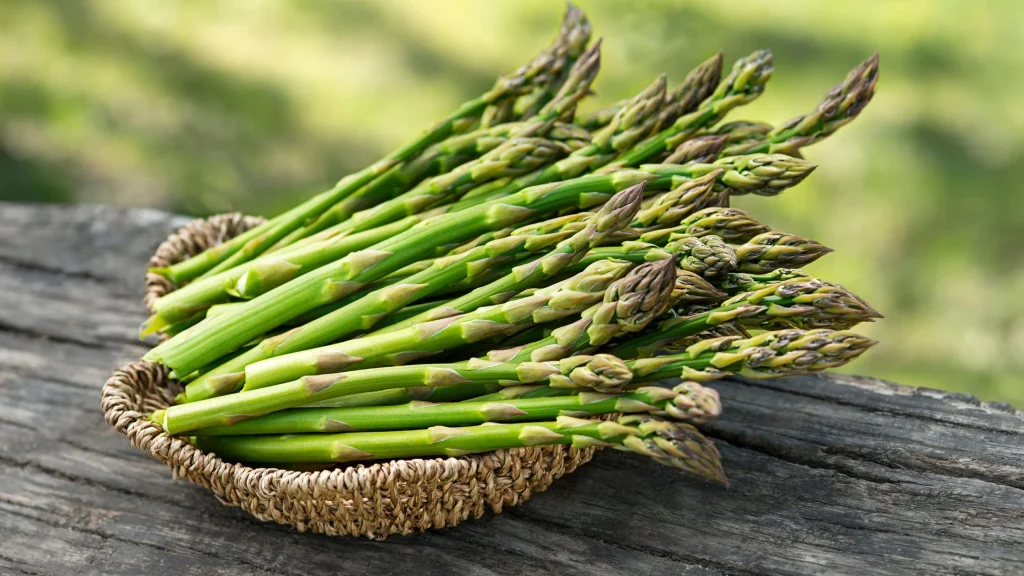
Key Takeaways:
- Learn how to select and purchase the freshest asparagus at the market
- Explore various cooking techniques like roasting and grilling for perfectly cooked asparagus
- Discover a collection of mouth-watering asparagus recipes to tantalize your taste buds
- Understand the health benefits of incorporating asparagus into your diet
- Explore the seasonal nature of asparagus and sustainable practices in its farming
Benefits of Asparagus
Asparagus isn’t just a delicious addition to your meals; it also offers a wide range of health benefits that can contribute to your overall wellbeing. Let’s explore the nutritional value and positive impact of asparagus on your health.
Nutritional Value
Asparagus is a nutrient-packed vegetable that provides essential vitamins and minerals to support your body’s functions. Here are some key nutrients found in asparagus:
- Vitamin K: Asparagus is rich in vitamin K, which plays a crucial role in blood clotting and bone health.
- Vitamin C: This vegetable is also a good source of vitamin C, an antioxidant that helps support your immune system and collagen production.
- Folate: Asparagus is high in folate, a vital B-vitamin that is important for cell growth and development, especially during pregnancy.
- Potassium: Asparagus contains potassium, a mineral that helps regulate blood pressure and supports proper muscle and nerve function.
- Fiber: With its high fiber content, asparagus can aid in digestion and promote a healthy gut.
Antioxidant Powerhouse
Antioxidants play a crucial role in protecting your cells from damage caused by free radicals. Asparagus is rich in antioxidants, including vitamins A and E, as well as selenium, which can help reduce the risk of chronic diseases such as heart disease and certain types of cancer.
Supports Digestive Health
The fiber content in asparagus promotes healthy digestion by adding bulk to your stool and supporting regular bowel movements. Additionally, asparagus contains a prebiotic called inulin, which helps nourish the beneficial bacteria in your gut, contributing to a healthy gut microbiome.
Promotes Heart Health
Asparagus is low in calories and fat while being packed with nutrients that promote heart health. Its high potassium content helps regulate blood pressure, reducing the risk of hypertension. The folate in asparagus also plays a role in maintaining cardiovascular health by supporting healthy blood flow and preventing the buildup of homocysteine, an amino acid associated with an increased risk of heart disease.
Protects Cognitive Function
Studies have shown that the folate content in asparagus may help protect against age-related cognitive decline. Folate is involved in the synthesis of neurotransmitters, which are essential for proper brain function.
“Asparagus is not only a tasty vegetable, but it also offers a host of health benefits. Incorporating this nutritious powerhouse into your diet can support heart health, digestive health, and cognitive function. The abundance of vitamins, minerals, and antioxidants found in asparagus showcases its potential to contribute to overall wellbeing.”
| Nutrient | Amount per 100g |
|---|---|
| Vitamin K | 41.6 mcg (52% DV) |
| Vitamin C | 10.1 mg (17% DV) |
| Folate | 52 mcg (13% DV) |
| Potassium | 202 mg (6% DV) |
| Fiber | 2.1 g (9% DV) |
Cooking Techniques for Asparagus
When it comes to cooking asparagus, there are several techniques that can elevate this delicious vegetable to new heights. Whether you prefer the earthy flavors of roasted asparagus, the smoky notes of grilled asparagus, or the versatility of various cooking methods, we have you covered. Get ready to create mouthwatering dishes that showcase the natural beauty and flavors of asparagus.
Roasted Asparagus
Roasting asparagus is a simple and flavorful way to bring out its natural sweetness. Follow these steps to achieve perfectly roasted asparagus:
- Preheat your oven to 425°F (220°C).
- Trim the woody ends of the asparagus spears by gently bending them until they snap.
- Place the asparagus on a baking sheet lined with parchment paper.
- Drizzle olive oil over the asparagus and toss to coat evenly. Sprinkle with salt and pepper.
- Roast in the preheated oven for 12-15 minutes, or until the asparagus is tender and slightly browned.
Roasted asparagus pairs well with a variety of seasonings, such as garlic, lemon zest, or Parmesan cheese. Feel free to experiment and customize the flavor according to your preferences.
Grilled Asparagus
Grilling asparagus imparts a smoky flavor that adds depth to its taste profile. Follow these steps for perfectly grilled asparagus:
- Preheat your grill to medium-high heat.
- Trim the woody ends of the asparagus spears.
- Brush the asparagus spears with olive oil and season with salt and pepper.
- Place the asparagus directly on the grill grates and cook for about 3-4 minutes per side, or until it becomes tender and has grill marks.
Feel free to get creative with your grilled asparagus by adding a balsamic glaze, a sprinkle of feta cheese, or a squeeze of fresh lemon juice.
Beyond Roasting and Grilling
While roasting and grilling are popular methods for cooking asparagus, there are plenty of other ways to prepare this versatile vegetable. Here are a few more delicious asparagus recipes to try:
- Asparagus Risotto: Create a creamy and flavorful risotto by incorporating tender asparagus spears.
- Asparagus Pasta: Toss cooked asparagus with al dente pasta, olive oil, garlic, and Parmesan for a quick and satisfying meal.
- Asparagus Salad: Combine blanched asparagus with mixed greens, cherry tomatoes, and a zesty vinaigrette for a refreshing salad.
These recipes are just a starting point, so don’t be afraid to experiment and let your creativity shine. Asparagus’s vibrant flavor pairs well with various ingredients, making it a versatile addition to many dishes.
Buying and Storing Fresh Asparagus
When it comes to enjoying the freshest asparagus, knowing how to buy and store it properly is essential. In this section, we’ll provide you with expert tips to help you select high-quality asparagus and keep it fresh for as long as possible.
Selecting the Best Asparagus
When buying asparagus, look for spears that are firm, straight, and vibrant in color. Avoid any that are limp, wilted, or have brown spots. The tips should be tightly closed and have a bright green or purple hue, depending on the variety.
While asparagus thickness is a matter of personal preference, thinner spears tend to be more tender and flavorful. Thicker spears are ideal for grilling or roasting, as they hold up better during cooking.
Understanding Different Types of Asparagus
Asparagus comes in several varieties, each with its distinct characteristics. The most commonly available types include:
- Green Asparagus: This is the most common type of asparagus, known for its grassy flavor and vibrant green color.
- White Asparagus: White asparagus is grown underground and is prized for its mild, delicate flavor. It is typically more expensive than green asparagus.
- Purple Asparagus: Purple asparagus has a sweeter taste and a vibrant purple color. It retains its color even after cooking.
Proper Storage for Freshness
To keep your asparagus fresh, follow these storage tips:
- Trim the ends: Before storing, trim about an inch from the bottoms of the asparagus spears to remove any tough and woody parts.
- Standing in water: For short-term storage, place the asparagus upright in a glass or jar with about an inch of water. Cover the top loosely with a plastic bag and store in the refrigerator.
- Wrapping in damp paper towels: Alternatively, you can wrap the trimmed asparagus in damp paper towels and store them in the refrigerator in a plastic bag. This method is suitable for storing asparagus for up to a week.
Remember, freshness is key when it comes to enjoying the best flavor and texture of asparagus. It’s best to consume your asparagus within a few days of purchase for the optimal taste experience.
Asparagus Recipes
Indulge in the delightful flavors of asparagus with our collection of mouth-watering recipes. With options ranging from simple sides to flavorful entrees, these dishes celebrate the versatility and deliciousness of asparagus. Whether you’re a seasoned chef or a beginner in the kitchen, our recipes are sure to awaken your taste buds and impress your friends and family.
Roasted Asparagus with Lemon and Parmesan
One of the most classic ways to enjoy asparagus is by roasting it to bring out its natural sweetness and slightly charred flavor. Try this simple and delicious recipe:
- Preheat your oven to 425°F (220°C).
- Trim the ends of the asparagus spears and place them on a baking sheet.
- Drizzle the asparagus with olive oil, fresh lemon juice, and sprinkle with grated Parmesan cheese.
- Season with salt and pepper, then toss to coat the asparagus evenly.
- Roast in the preheated oven for 12-15 minutes, or until the asparagus is tender and slightly golden.
- Serve hot and garnish with lemon zest and additional Parmesan, if desired.
Asparagus and Goat Cheese Tart
This savory tart is a perfect choice for brunch or a light lunch. The creamy goat cheese complements the earthy flavor of asparagus. Here’s how to make it:
- Preheat your oven to 375°F (190°C).
- Roll out a puff pastry sheet on a lightly floured surface and transfer it to a baking sheet.
- Spread a layer of goat cheese onto the pastry sheet, leaving a border around the edges.
- Arrange blanched asparagus spears on top of the goat cheese.
- Season with salt, pepper, and a sprinkle of fresh herbs like thyme or rosemary.
- Bake for 20-25 minutes, or until the pastry is golden and the asparagus is tender.
- Allow the tart to cool slightly before slicing and serving.
Grilled Asparagus with Balsamic Glaze
Grilling asparagus adds a smoky flavor and a lovely char to the spears. Pair it with a tangy balsamic glaze for a mouthwatering side dish:
- Preheat your grill to medium-high heat.
- Trim the ends of the asparagus and toss them with olive oil, salt, and pepper.
- Place the asparagus on the grill and cook for 3-4 minutes per side, or until they have grill marks and are crisp-tender.
- Meanwhile, in a small saucepan, simmer balsamic vinegar until it thickens into a glaze-like consistency.
- Drizzle the balsamic glaze over the grilled asparagus and serve immediately.
These recipes are just a glimpse into the world of asparagus delights. From creamy soups to refreshing salads, the possibilities are endless when it comes to incorporating asparagus into your meals. So get creative, experiment with flavors, and enjoy the deliciousness of this versatile vegetable!
Incorporating Asparagus into a Healthy Diet
When it comes to maintaining a healthy lifestyle, incorporating nutrient-rich foods into your diet is essential. Asparagus, with its impressive array of health benefits, makes a valuable addition to any nutritious eating plan. Let’s explore the reasons why asparagus is a fantastic choice for promoting overall well-being.
Asparagus Nutrition: A Treasure Trove of Essential Nutrients
Packed with essential vitamins and minerals, asparagus is a nutritional powerhouse. It is a good source of vitamins A, C, E, and K, as well as folate, which plays a crucial role in cell production and DNA synthesis. Asparagus also contains important minerals such as potassium, iron, and calcium.
Did You Know? Asparagus is one of the richest natural sources of folate, making it highly beneficial for expectant mothers as folate helps prevent neural tube defects in infants.
Furthermore, asparagus is low in calories, making it an excellent choice for weight management. One cup of cooked asparagus contains just 32 calories while providing a hefty dose of dietary fiber, which aids digestion and promotes feelings of fullness.
Health Benefits of Asparagus: A Comprehensive View
The health benefits of asparagus go beyond nutrition and extend to various aspects of our well-being. Here are some key advantages:
- Anti-inflammatory properties: Asparagus contains antioxidants such as flavonoids and polyphenols, which possess anti-inflammatory properties and may help reduce the risk of chronic diseases.
- Heart health support: Asparagus is a natural source of compounds like rutin and saponins that may help lower blood pressure and support a healthy cardiovascular system.
- Digestive health promotion: The high fiber content in asparagus supports digestive health by promoting regular bowel movements and preventing constipation.
- Improved cognitive function: Asparagus is rich in folate, a nutrient that plays a crucial role in brain health and cognitive function.
Ways to Enjoy Asparagus for Optimal Health
Incorporating asparagus into your meals is both easy and delicious. Here are some ideas for enjoying this nutritious vegetable:
- Steam or sauté asparagus and serve it as a side dish or add it to pasta or stir-fries.
- Grill asparagus for a smoky flavor and serve it alongside grilled meats or vegetables.
- Roast asparagus in the oven with a sprinkle of olive oil and seasoning for a crunchy and flavorful side dish.
The Benefits of Asparagus: A Summary
By incorporating asparagus into your healthy diet, you can benefit from its wealth of nutrients, low-calorie content, and various health-promoting properties. Whether you enjoy it as a side dish, in salads, or incorporated into other recipes, asparagus is a versatile vegetable that offers immense value to your well-being.
| Health Benefits | Nutrients |
|---|---|
| Anti-inflammatory properties | Flavonoids, polyphenols |
| Heart health support | Rutin, saponins |
| Digestive health promotion | Dietary fiber |
| Improved cognitive function | Folate |
Seasonal Asparagus and Sustainability
Asparagus is not only a delicious vegetable but also one that is best enjoyed during its peak season. Understanding the seasonal nature of asparagus can enhance your culinary experience and provide a range of benefits.
The asparagus season, typically from late spring to early summer, offers an abundance of fresh and flavorful spears. During this time, seasonal asparagus is at its prime, packed with nutrients and vibrant flavors that are unmatched. The key to capturing the true essence of asparagus lies in consuming it when it is in season.
By embracing seasonal asparagus, you not only indulge in its exceptional taste but also support sustainable practices in asparagus farming. Local farmers work diligently to cultivate asparagus during its prime season, ensuring minimal environmental impact and promoting sustainable agricultural practices.
“Asparagus has a short growing season, making it an ideal vegetable for emphasizing the importance of seasonal produce and supporting local growers. By choosing seasonal asparagus, you contribute to the preservation of agricultural diversity and the reduction of carbon emissions associated with long-distance transportation.”
Furthermore, consuming seasonal asparagus allows you to enjoy the highest quality produce. Since it is harvested at its peak, the nutritional content of asparagus is at its maximum during its season. This means you get the most out of its nutritional benefits and optimize your health and well-being.
The Advantages of Growing Asparagus Locally
When it comes to asparagus, supporting local growers has its own set of advantages. By purchasing locally grown asparagus, you contribute to your local economy, stimulate community growth, and foster a sense of connection with your food sources.
Local asparagus farmers prioritize sustainable practices and often employ organic and environmentally-friendly methods in their cultivation. This helps to minimize the use of harmful pesticides and preserves the soil health, ensuring the long-term viability of asparagus production in the region.
“Opting for locally grown asparagus means you can trace the origins of your food, supporting transparency in the supply chain. It also provides an opportunity to engage with local farmers, gain insight into their practices, and develop a deeper appreciation for the effort that goes into growing this delectable vegetable.”
By purchasing locally grown asparagus, you become a part of a movement that values sustainable agriculture, celebrates the freshness of seasonal produce, and promotes a stronger, more resilient local food system. So the next time you go shopping, remember to look out for asparagus season and choose seasonal asparagus sourced from your local farmers.
| Benefits of Seasonal Asparagus | Sustainable Asparagus Farming Practices |
|---|---|
| Packed with nutrients Exceptional flavor Fresher and higher quality Supports local farmers and the economy | Minimal environmental impact Promotes biodiversity Reduces carbon emissions Preserves soil health Supports organic and sustainable farming methods |
Conclusion
In conclusion, asparagus is not only a delectable vegetable but also a nutritious addition to your meals. With its rich flavor and versatility, asparagus can be enjoyed in numerous ways, whether it’s roasted to perfection, grilled to bring out its natural sweetness, or incorporated into various recipes to elevate your dishes.
But the benefits of asparagus go beyond its taste. This seasonal delight is packed with essential nutrients, including vitamins A, C, and K, folate, and fiber. These nutrients contribute to a well-rounded diet and support overall health.
Embrace the seasonal delights of asparagus and savor the flavors of this vibrant vegetable. Whether you’re looking for a healthy side dish, a vibrant salad, or a delicious main course, asparagus is sure to impress. So head to your local market, select the freshest bunch, and get creative in the kitchen. Your taste buds and your health will thank you!
FAQ
How do I cook asparagus?
Asparagus can be cooked using various techniques such as roasting, grilling, or steaming. The most common method is to trim the ends, toss the asparagus in olive oil, salt, and pepper, and then roast them in the oven at 400°F for about 12-15 minutes. For more detailed instructions and other cooking techniques, check out our section on Cooking Techniques for Asparagus.
What are the benefits of eating asparagus?
Asparagus is packed with nutrients and offers several health benefits. It is a good source of fiber, vitamins A, C, and K, as well as folate and antioxidants. Asparagus can help support digestion, boost your immune system, and promote healthy brain function. To learn more about the specific benefits and nutritional value of asparagus, refer to our section on Benefits of Asparagus.
How should I store fresh asparagus?
To keep your fresh asparagus crispy and flavorful, start by trimming the ends and storing them upright in a jar or glass filled with an inch of water. Cover the top loosely with a plastic bag and keep it in the refrigerator. Alternatively, you can wrap the damp ends with a moist paper towel and then place them in a plastic bag. Stored properly, asparagus can stay fresh for up to a week. For more tips on buying and storing fresh asparagus, see our section on Buying and Storing Fresh Asparagus.
When is asparagus in season?
Asparagus is a seasonal vegetable, with its peak season typically falling in the spring, from April to June. However, the exact season can vary depending on your location and climate. It is best to check with your local farmers’ market or grocery store to find out when fresh asparagus is available in your area. For more information on the seasonal nature of asparagus and its sustainability, refer to our section on Seasonal Asparagus and Sustainability.
Can you provide some delicious asparagus recipes?
Absolutely! We have a collection of mouth-watering asparagus recipes that range from simple sides to flavorful entrees. Try our recipe for Roasted Asparagus with Lemon and Parmesan or the Grilled Asparagus with Balsamic Glaze. For more inspiration and detailed recipes, head over to our section on Asparagus Recipes.
Is asparagus a good choice for a healthy diet?
Yes, asparagus is an excellent addition to a healthy diet. It is low in calories, high in fiber, and packed with essential vitamins and minerals. Asparagus also provides antioxidants and can help support digestion and weight management. To learn more about how asparagus can be incorporated into a healthy diet, check out our section on Incorporating Asparagus into a Healthy Diet.
How do I choose the best asparagus at the store?
When buying fresh asparagus, look for firm, bright green stalks with tightly closed tips. Avoid any that appear wilted or have mushy or slimy stems. The thickness of asparagus can vary, so choose based on your preference – thin stalks are tender and cook quickly, while thicker stalks have a meatier texture. For more guidance on buying and identifying quality asparagus, see our section on Buying and Storing Fresh Asparagus.
Can I grow my own asparagus?
Yes, you can grow asparagus in your own garden if you have the space and patience. Asparagus is a perennial plant that takes a few years to become established and produce a bountiful harvest. It requires well-drained soil and a sunny location. For detailed instructions on growing asparagus, including planting, care, and maintenance tips, consult our guide on Growing Asparagus.






